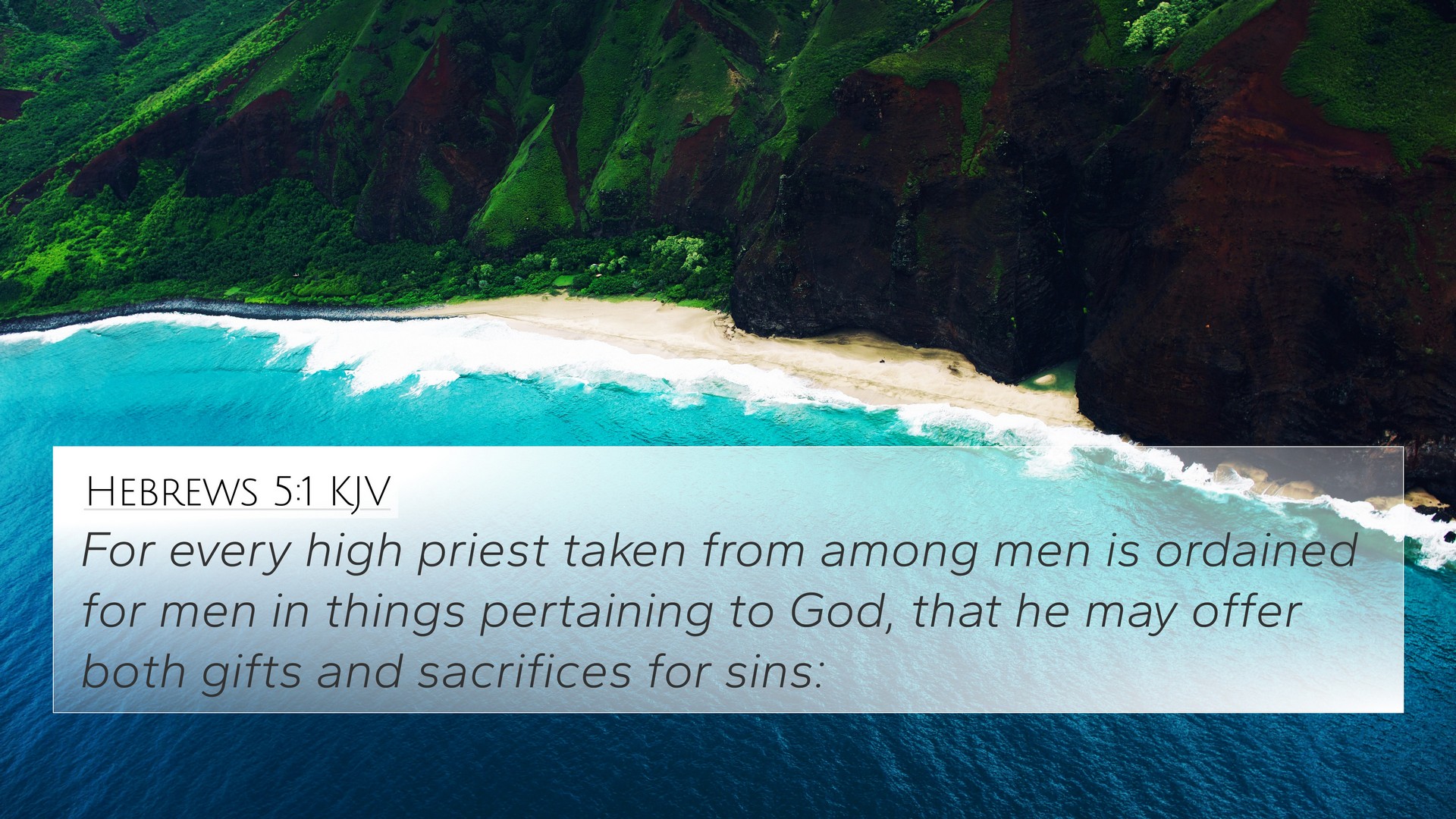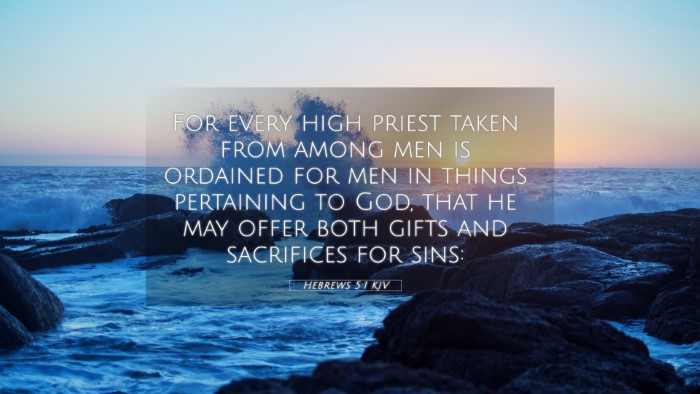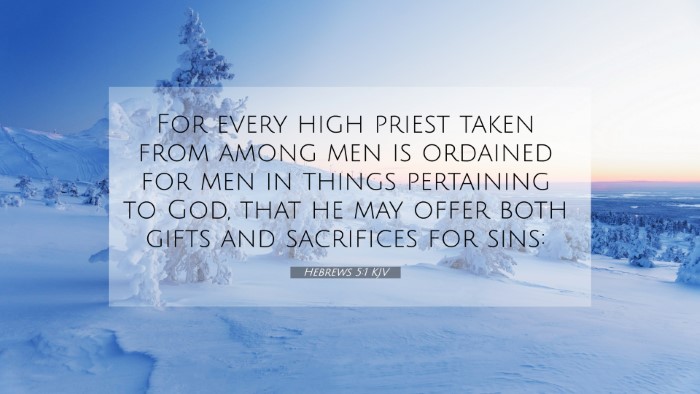Old Testament
Genesis Exodus Leviticus Numbers Deuteronomy Joshua Judges Ruth 1 Samuel 2 Samuel 1 Kings 2 Kings 1 Chronicles 2 Chronicles Ezra Nehemiah Esther Job Psalms Proverbs Ecclesiastes Song of Solomon Isaiah Jeremiah Lamentations Ezekiel Daniel Hosea Joel Amos Obadiah Jonah Micah Nahum Habakkuk Zephaniah Haggai Zechariah MalachiHebrews 5:1 Similar Verses
Hebrews 5:1 Cross References
For every high priest taken from among men is ordained for men in things pertaining to God, that he may offer both gifts and sacrifices for sins:
Uncover the Rich Themes and Topics of This Bible Verse
Listed below are the Bible themes associated with Hebrews 5:1. We invite you to explore each theme to gain deeper insights into the Scriptures.
Hebrews 5:1 Cross Reference Verses
This section features a detailed cross-reference designed to enrich your understanding of the Scriptures. Below, you will find carefully selected verses that echo the themes and teachings related to Hebrews 5:1 KJV. Click on any image to explore detailed analyses of related Bible verses and uncover deeper theological insights.

Hebrews 8:3 (KJV) »
For every high priest is ordained to offer gifts and sacrifices: wherefore it is of necessity that this man have somewhat also to offer.
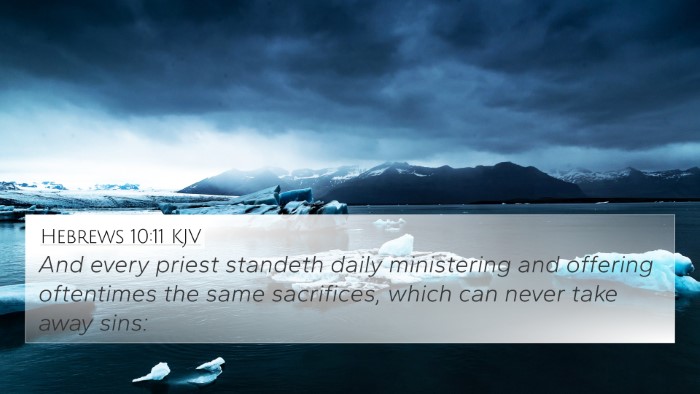
Hebrews 10:11 (KJV) »
And every priest standeth daily ministering and offering oftentimes the same sacrifices, which can never take away sins:
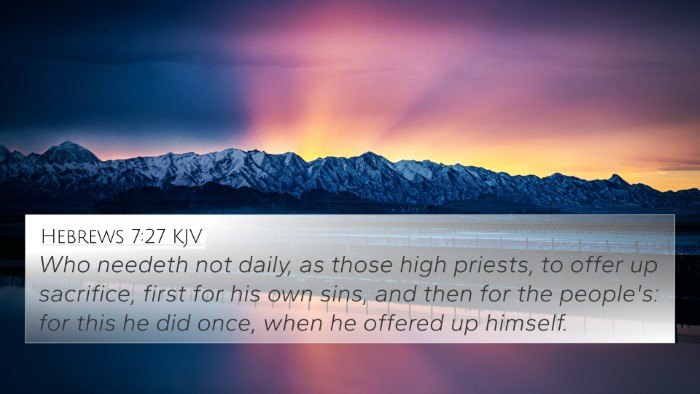
Hebrews 7:27 (KJV) »
Who needeth not daily, as those high priests, to offer up sacrifice, first for his own sins, and then for the people's: for this he did once, when he offered up himself.
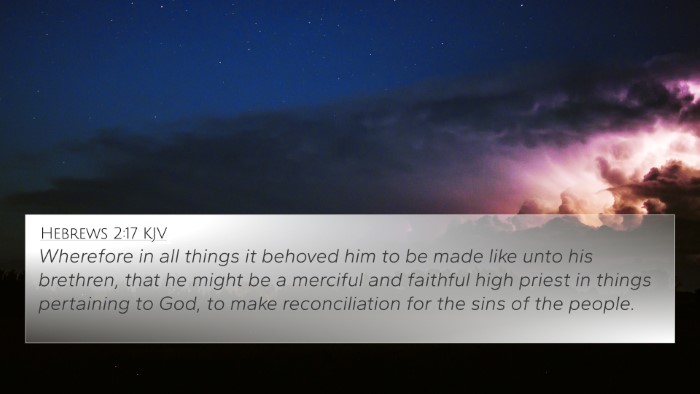
Hebrews 2:17 (KJV) »
Wherefore in all things it behoved him to be made like unto his brethren, that he might be a merciful and faithful high priest in things pertaining to God, to make reconciliation for the sins of the people.
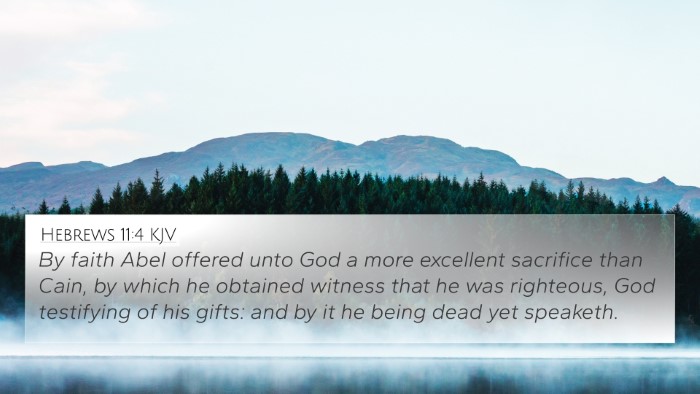
Hebrews 11:4 (KJV) »
By faith Abel offered unto God a more excellent sacrifice than Cain, by which he obtained witness that he was righteous, God testifying of his gifts: and by it he being dead yet speaketh.
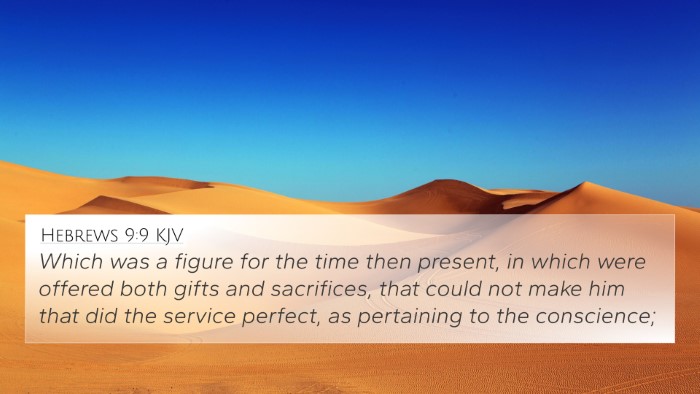
Hebrews 9:9 (KJV) »
Which was a figure for the time then present, in which were offered both gifts and sacrifices, that could not make him that did the service perfect, as pertaining to the conscience;
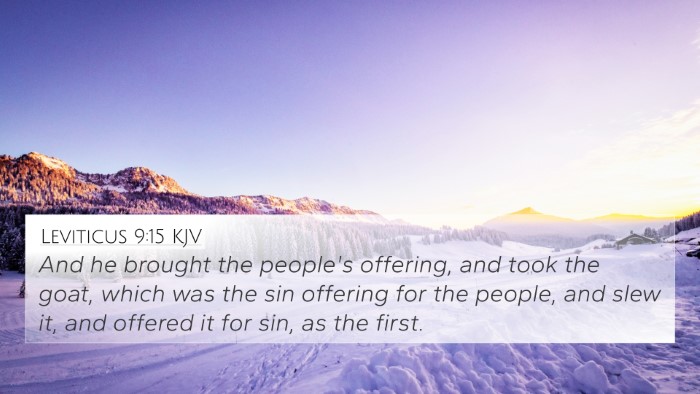
Leviticus 9:15 (KJV) »
And he brought the people's offering, and took the goat, which was the sin offering for the people, and slew it, and offered it for sin, as the first.
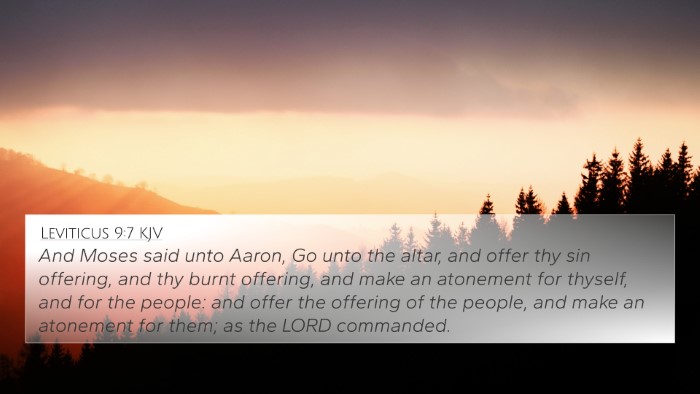
Leviticus 9:7 (KJV) »
And Moses said unto Aaron, Go unto the altar, and offer thy sin offering, and thy burnt offering, and make an atonement for thyself, and for the people: and offer the offering of the people, and make an atonement for them; as the LORD commanded.
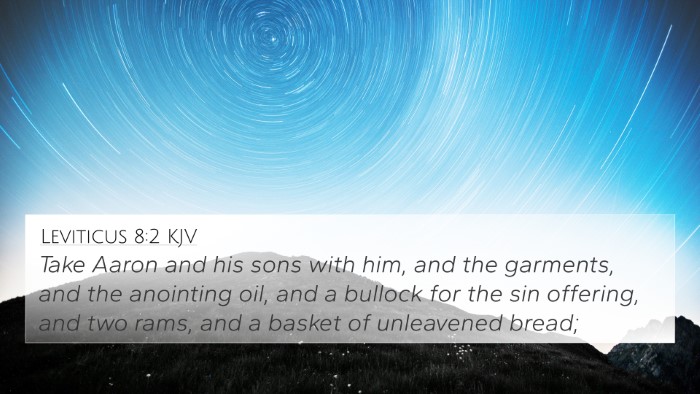
Leviticus 8:2 (KJV) »
Take Aaron and his sons with him, and the garments, and the anointing oil, and a bullock for the sin offering, and two rams, and a basket of unleavened bread;
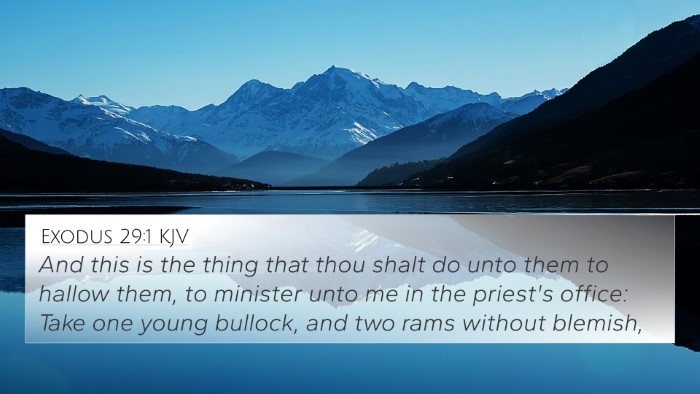
Exodus 29:1 (KJV) »
And this is the thing that thou shalt do unto them to hallow them, to minister unto me in the priest's office: Take one young bullock, and two rams without blemish,

Numbers 16:46 (KJV) »
And Moses said unto Aaron, Take a censer, and put fire therein from off the altar, and put on incense, and go quickly unto the congregation, and make an atonement for them: for there is wrath gone out from the LORD; the plague is begun.
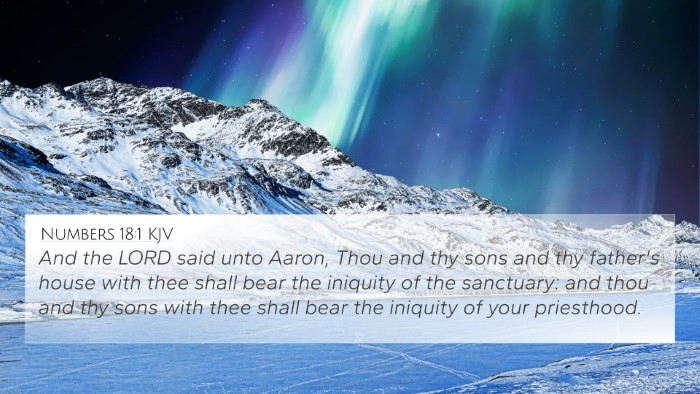
Numbers 18:1 (KJV) »
And the LORD said unto Aaron, Thou and thy sons and thy father's house with thee shall bear the iniquity of the sanctuary: and thou and thy sons with thee shall bear the iniquity of your priesthood.
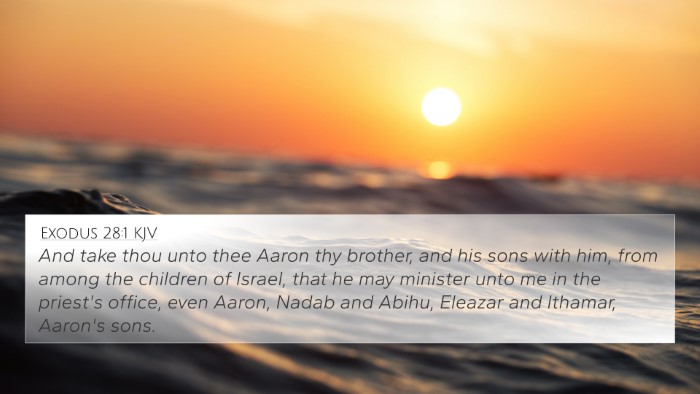
Exodus 28:1 (KJV) »
And take thou unto thee Aaron thy brother, and his sons with him, from among the children of Israel, that he may minister unto me in the priest's office, even Aaron, Nadab and Abihu, Eleazar and Ithamar, Aaron's sons.
Hebrews 5:1 Verse Analysis and Similar Verses
Hebrews 5:1 - Summary and Biblical Insights
Hebrews 5:1 states: "For every high priest taken from among men is ordained for men in things pertaining to God, that he may offer both gifts and sacrifices for sins."
Meaning and Interpretation
This verse outlines the role and purpose of the high priest in the context of both Jewish tradition and Christian theology. It emphasizes that the high priest serves as an intermediary between God and humanity, being chosen from among men to represent them before God. The high priest not only performs essential religious duties but also offers gifts and sacrifices to atone for the sins of the people.
Commentary Insights
-
Matthew Henry:
Matthew Henry explains that the high priest's role was divinely appointed, underscoring a humanity that necessitates mediation due to sin. He notes that the high priest offers sacrifices not only for others but also for himself, as he too is a sinner. This sets the stage for Christ's fulfillment of this role as the ultimate high priest who does not need to offer sacrifices for Himself.
-
Albert Barnes:
Barnes highlights the significance of the high priest being taken "from among men." This designation signifies a unique understanding of human struggles and frailty, which enhance the high priest's capability to mediate effectively. Barnes also points out that the sacrifices belong to God, which reflects a pivotal aspect of worship – offering something that holds value to God from a place of obedience.
-
Adam Clarke:
Clarke elaborates on the high priest's duty to act on behalf of the people, emphasizing that he must be compassionate and understanding towards their failures. The sacrificial system is seen as both a temporary measure and a foreshadowing of Christ's ultimate atonement. Clarke also warns against viewing the high priest merely as a mechanical figure, as his position is rooted in deeply personal and communal dimensions.
Bible Cross References
Hebrews 5:1 connects with several critical Bible verses that further illuminate the nature and function of the high priesthood. These connections allow for a richer understanding of biblical themes and the continuity of God's redemptive plan. Here are some significant verses to consider:
- Exodus 28:1: Ordination of Aaron and his sons as priests.
- Leviticus 16:21-22: The Day of Atonement rituals involving sacrifices for the people.
- Hebrews 4:14-16: Jesus as our great high priest who can empathize with our weaknesses.
- Hebrews 7:26-27: Comparison of Christ’s sacrificial role to the Levitical priests.
- Numbers 16:5: God’s selection of the priesthood.
- 1 Peter 2:9: Believers as a royal priesthood, linking to Christ’s high priesthood.
- Romans 8:34: Christ as intercessor - a key aspect of the high priest's role.
- John 10:11: Jesus as the good shepherd who lays down His life, akin to a high priest's sacrificial role.
- Matthew 26:28: Jesus' reference to His blood as the covenant for many, relating to sacrificial practice.
- Isaiah 53:5: Prophetic foreshadowing of Christ’s suffering and sacrificial death for our sins.
Thematic Connections
The various connections between the high priesthood and the themes of sacrifice, mediation, and atonement illustrate the multifaceted nature of God's relationship with His people throughout scripture. Understanding how Hebrews 5:1 interacts with these themes is essential for interpreting its depth and implications within the Christian faith.
Tools for Bible Cross-Referencing
- Utilizing a Bible concordance can help identify related scriptures.
- Employ a cross-reference Bible study to delve deeper into themes.
- Find resources that provide Bible chain references to trace themes across the text.
How to Use Bible Cross-References
When studying passages like Hebrews 5:1, it is beneficial to cross-reference with other related verses. Use a Bible cross-reference guide to identify connections, or utilize digital resources that allow for easier navigation of cross-referencing Bible study methods. These tools enhance comprehension and provide a broader understanding of scripture.
Conclusion
Hebrews 5:1 serves as a pivotal verse that encapsulates the essence of the high priesthood within the biblical narrative. Through the insights of biblical commentaries and the connections established through cross-references, one can appreciate the depth of this scripture and its implications for understanding salvation history. Employing thematic Bible verse connections aids in a more profound grasp of God’s word and its application in our lives.
